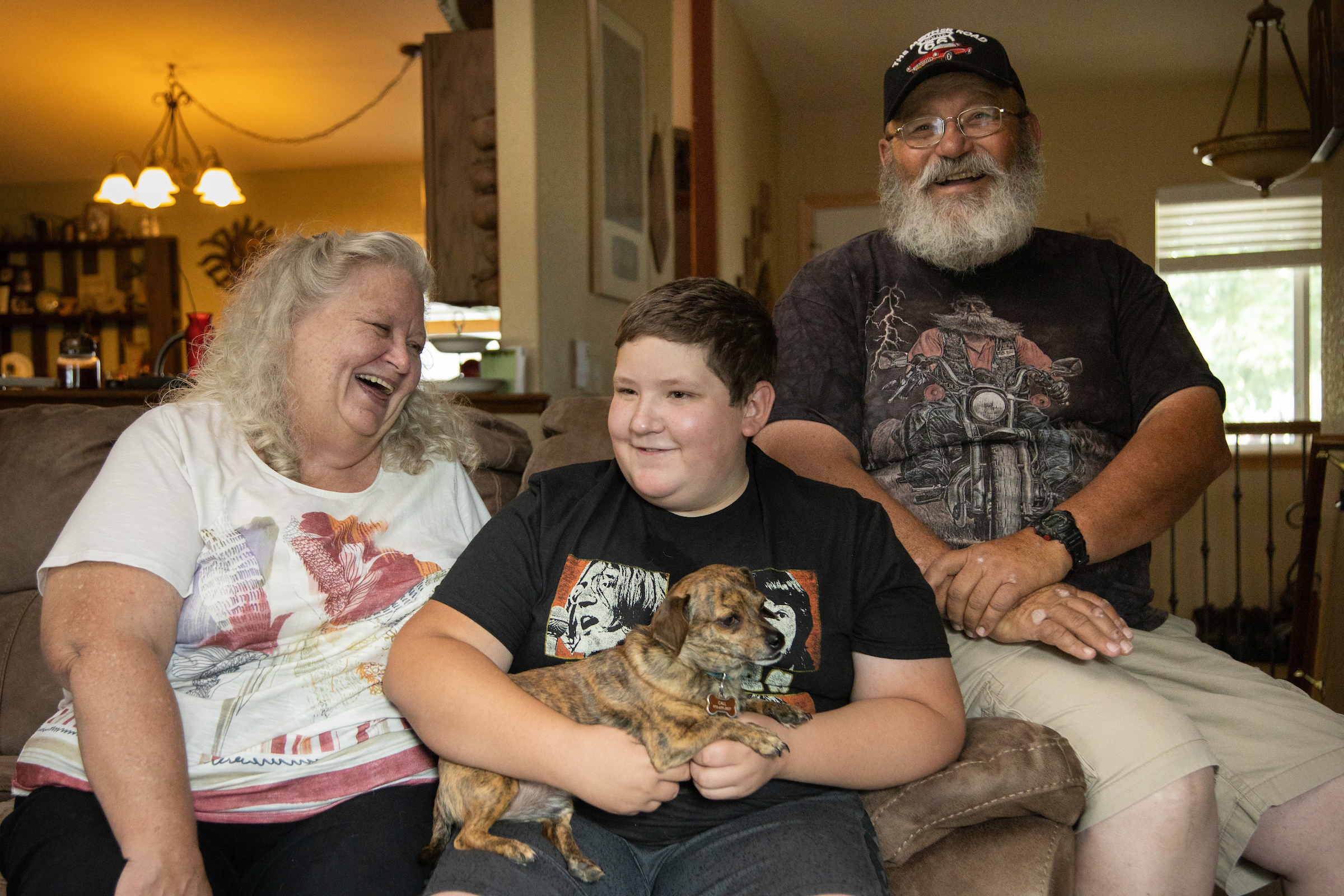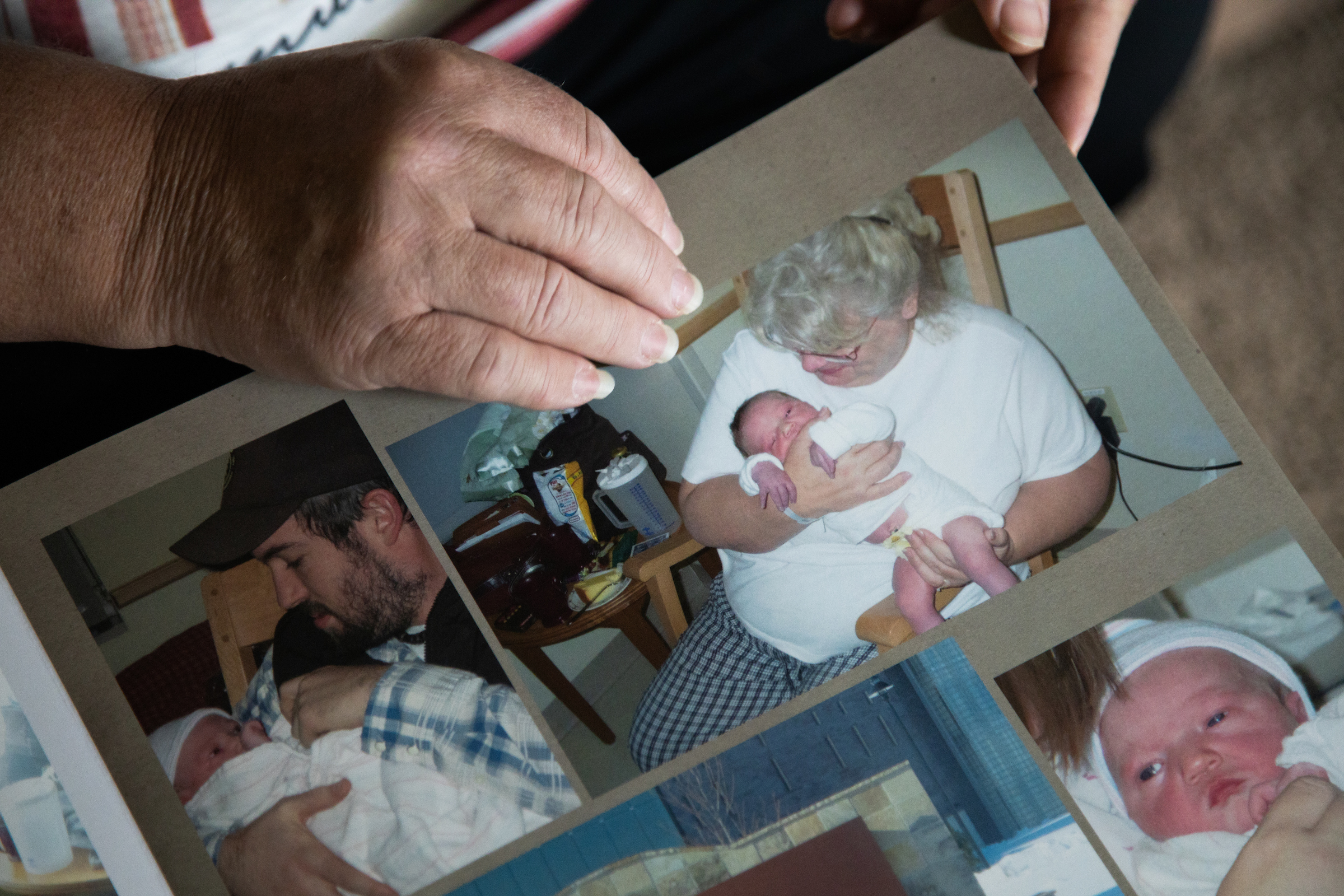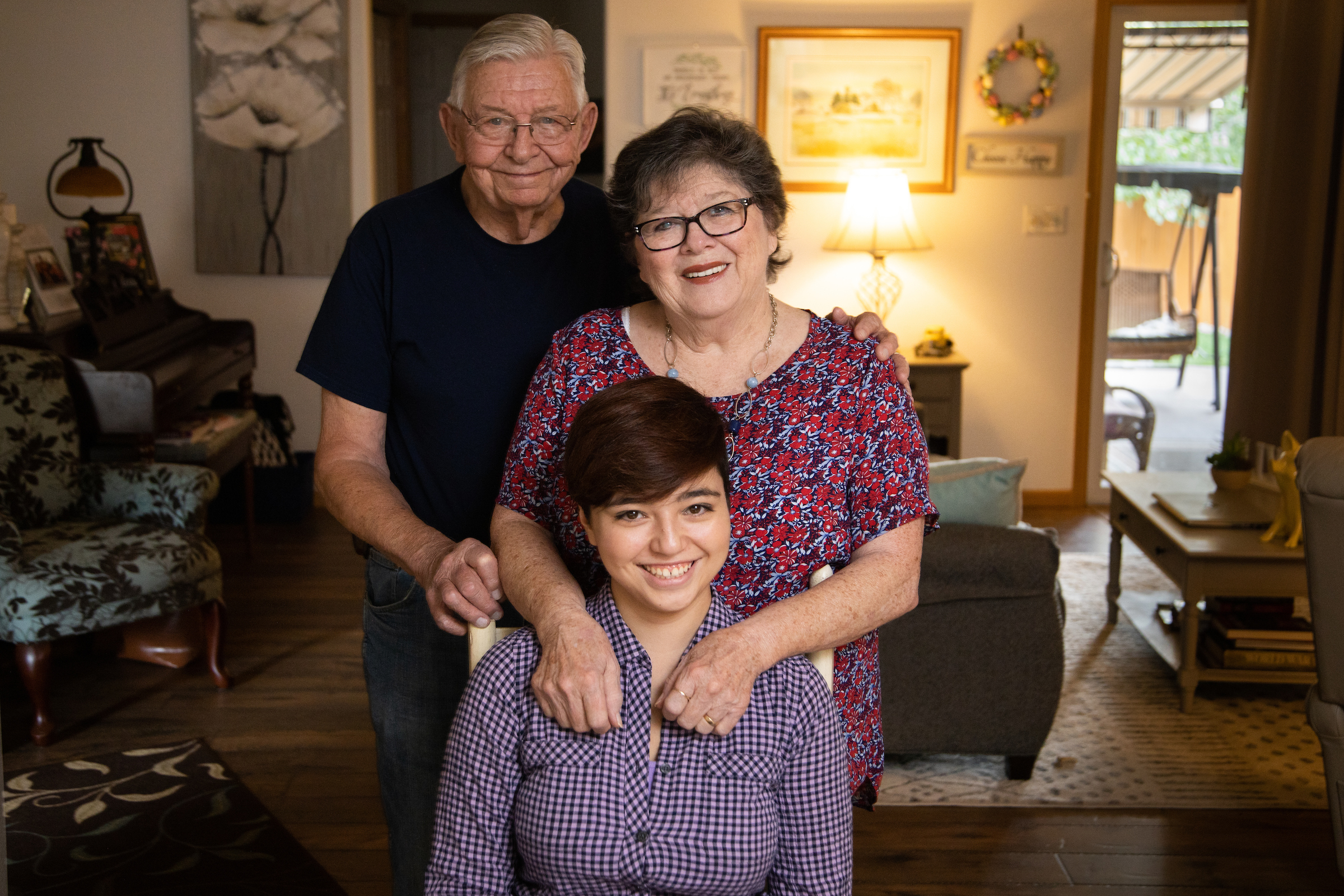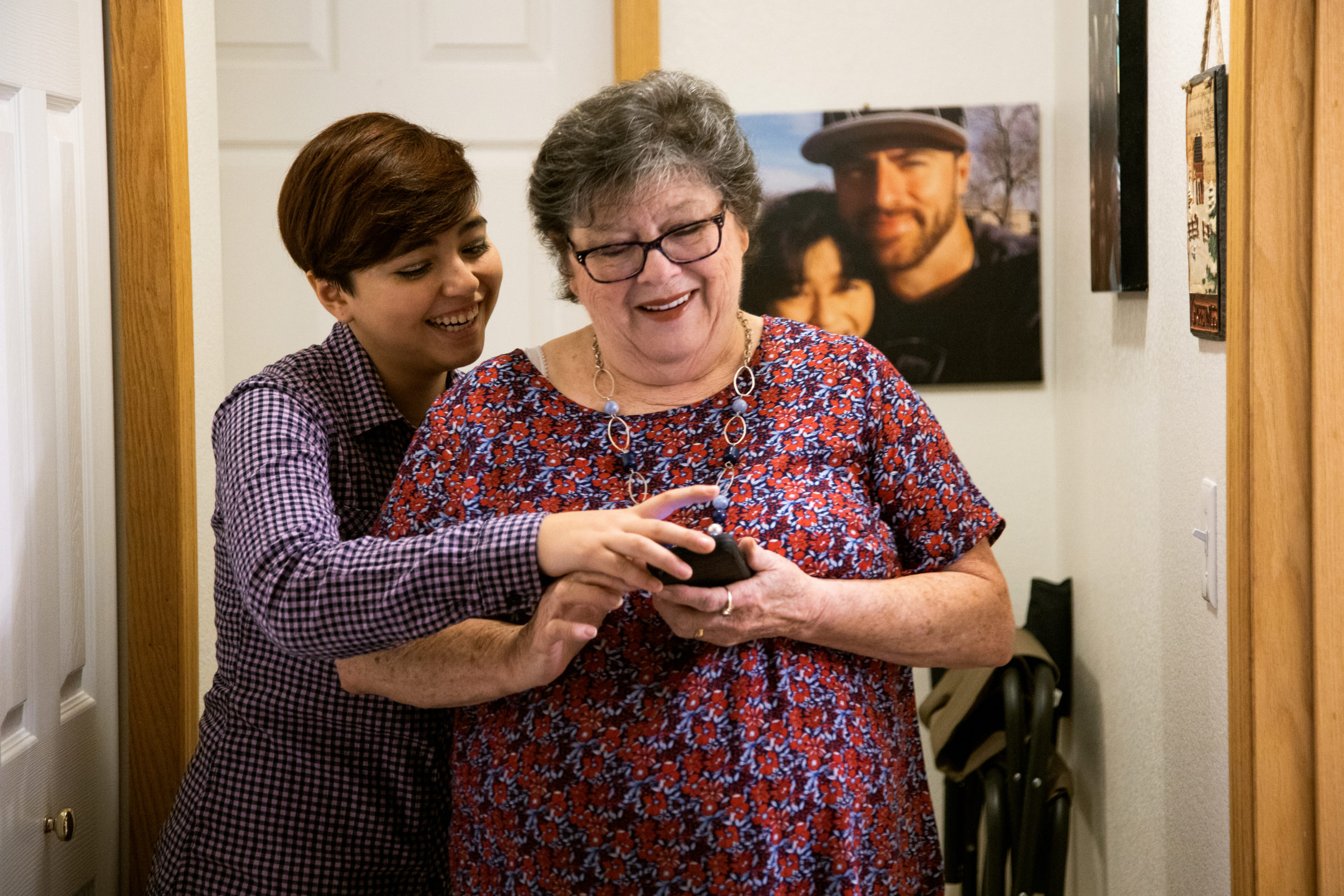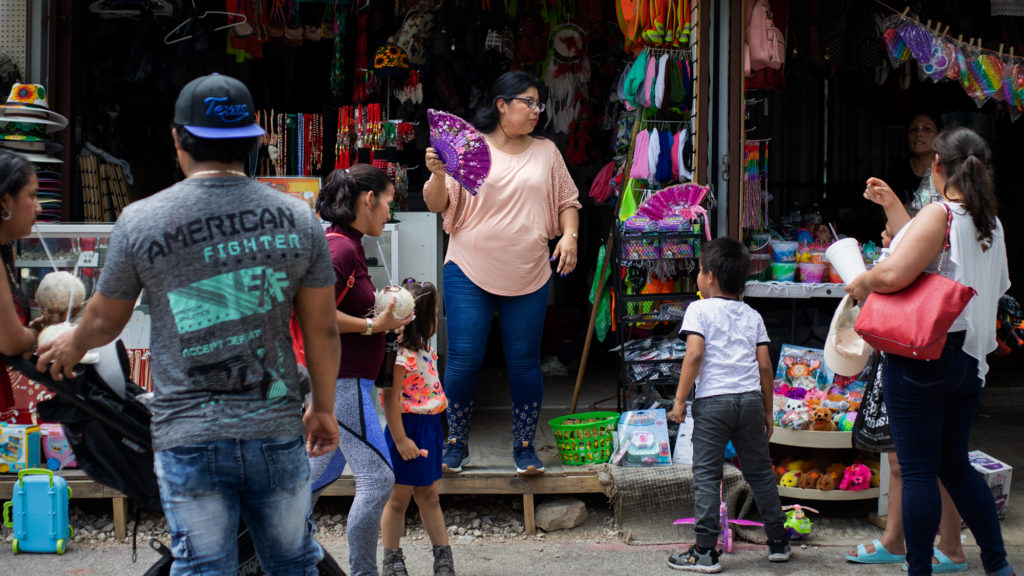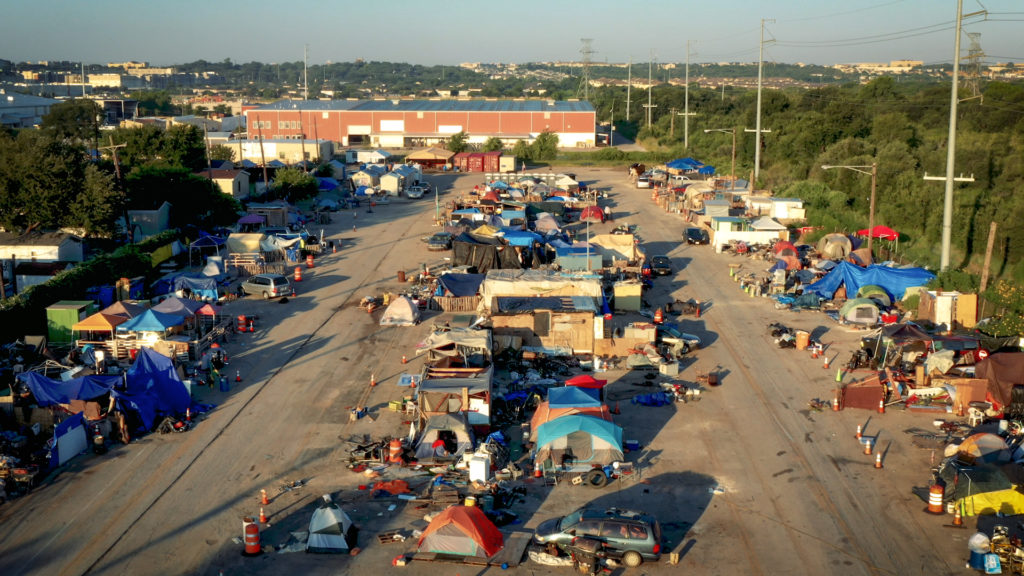This story is equipped with a feature called SoundCite. Click on highlighted words with a “play” symbol to hear more from the people interviewed for this story.
Gail Engel never thought she’d become a mother again at the age of 51, but after raising two daughters, she became the primary caregiver for her grandson, Bryson.
Gail’s oldest daughter wrestled with mental illness, an eating disorder, and anxiety for years. When she gave birth to Bryson, he and his mom lived with Gail, who watched her daughter struggle to care for and connect with the baby.
“She couldn’t feed him, so I kept feeding him, thinking, ‘This is not going to work. If she doesn’t nurse with him, he’s going to bond with me,’” Gail says. “Sure enough, that’s exactly what happened.”
Little by little, Gail took on a mothering role while her daughter’s challenges continued. At the same time, Bryson showed signs of mental and emotional challenges. He was later diagnosed with fetal alcohol syndrome, Asperger syndrome, and other complications.
“The mental health of my daughter was one issue,” Gail says. “The mental health of my grandchild was another. Then it came to my issue. It was very traumatic to me and my life and my husband. We now know this trauma affects the whole family, not just one individual.”
As it became clear that Bryson needed his grandparents’ care full-time, Gail set to work trying to understand what came next in terms of guardianship and resources, while still working as a bookkeeper. She made calls and searched the internet looking for guidance, but information was scarce and confusing, and few people understood her situation.
“Counselors didn’t understand. Schools didn’t understand. Nobody seemed to understand,” she says. “I tried to find help, but I couldn’t find any. It was not that I wasn’t able to connect with it — it was not there.”
To support other grandfamilies and share the information she worked so hard to collect and decipher, Gail launched theGrand Family Coalition (GFC), based in Loveland, Colorado, in 2013.
The organization provides a resource library on its website that includes legal information, research on grandfamilies, mental health topics, recommended reading, and benefits information. But personal connections within the group allow grandparents to teach one another what they’ve learned through experience.
Through its support groups for kinship caregivers and teens — previously held in person, but now online — participants share their concerns, joys, and heartaches and help one another move through the hardship of their situation. GFC also helps families by connecting them to other nonprofits in the area that provide essential items, like beds and dressers, or ongoing resources, like counseling.
“Resources are finite, and they’re heavily guarded,” says Sandra Williams, one grandmother in the coalition who asked that we use a pseudonym due to ongoing custody proceedings. “To be able to tap into those resources, you really have to be determined and knowledgeable.”
Sandra came to Fort Collins, Colorado, from Europe to care for her two grandsons after they were removed from the custody of her daughter, who suffers from mental illness.
“I was about to start another job in Asia. I had already applied for it and been accepted,” Sandra says. “We were really looking forward to the move, my husband was looking forward to retirement, and then I got the call. Morally and ethically, I had to go.”
The decision brought her to another country, where, as a biracial woman with an accent, she felt out of place and misunderstood. The move also ended her marriage.
Because Sandra is not from the area where she now lives with her two grandsons, she doesn’t have family or friends nearby to support her. But she found a sense of community with the Grand Family Coalition.
“Everybody in the grandparent group has their own story, and they’re all individuals,” Sandra says. “Knowing other people who are raising their grandchildren — that’s been very validating because I don’t feel so alone.”
Grandparent and kinship caregivers take on roles similar to those of foster families, filling in where biological parents can’t or won’t. Placing children with relatives, as opposed to non-relative foster families, is widely thought to provide better outcomes for children because family placements increase stability and safety, lead to better behavioral and mental health outcomes, and help kids stay connected to siblings and their culture of origin.
Family caregivers now comprise a significant segment of the childcare safety net. According to the State of Grandfamilies 2020 report from Generations United, approximately 2.7 million children live with grandfamilies or kinship families, and nearly half of these caregivers are 60 or older. In Colorado, 25 percent of children in foster care in 2018 were being raised by relatives.
At the same time, kinship caregivers exist in a strange liminal space. There are five different official designations for this type of child custody, including legal adoption, informal kinship care, temporary guardianship, voluntary kinship care, and formal kinship care. Each involves varying degrees of oversight from child welfare agencies, varying degrees of autonomy in terms of decision-making for children, and varying levels of government support.
Bud and Beverly Barr began caring for Beverly’s great-granddaughter, Lauren, when she was four years old and Beverly was 72. Lauren is now 15, and Bud picks her up from school each day and takes her out for ice cream or Starbucks when she asks. “Once we got her, in his words, she captured his heart,” Beverly says.
“We have grandparents who are raising two different grandchildren, and because one child came through the child welfare system, they get foster care stipends, TANF (Temporary Assistance for Needy Families) payments, Medicaid, all the resources,” Gail says. “But the other sibling who did not come to them through the child welfare system and was just absorbed through the family does not get all of those services. So, these grandparents ask me, ‘What makes one child more worthy of support than another child from the same family?’”
Some grandparents are reluctant to become involved with the child welfare system, Gail says, because it brings greater oversight, and caregivers fear that children will be removed for perceived neglect or a minor infraction. But if grandparent caregivers don’t become licensed foster families, they are guaranteed to receive fewer supports and benefits than non-relative foster families.
Gail attributes this, in part, to agencies needing to track their spending and hold themselves accountable to taxpayers. But the result is frustrating for grandparents who care for children and keep them out of the system, which saves American taxpayers approximately $4 billion a year.
Gail had to learn all of this the hard way, by teaching herself, while she continued to work and care for her grandson with special needs. Making sense of the various designations, pathways, and benefits is challenging on its own, in addition to the challenges grandparents typically face.
“It becomes a burden to a family already in crisis,” Gail says. “Many grandparents don’t want to take the time to do it because it just seems too daunting to handle.”
According to Generations United, about 56 percent of grandparent caregivers are still working while caring for children, while about 25 live with a disability, compared to 6 percent of parents. Kinship caregivers are disproportionately Black or Native American, two groups who have been harmed at higher rates by the effects of the COVID-19 pandemic, which has made life even more challenging for grandparent caregivers who have a harder time with physical limitations, transportation, and technology.
Beverly Barr was 72 when she and her husband, Bud Barr, began caring for their great-granddaughter Lauren, who is now 15. “Lauren came to us at less than four years old with the inability to pronounce her own name,” Beverly says. “She barely spoke. She just pointed to things.”
At the time, child protective services was preparing to remove Lauren and her sibling from her mother’s custody. Lauren’s father, Beverly’s grandson, was in prison at the time, though he now lives nearby and has become a positive influence in Lauren’s life.
“It was never in our mind that we would ever be raising a kid [at that time in our lives],” says Beverly. “In fact, Bud thought he couldn’t do it. But then he went to court with me, at times, and saw what life was like for Lauren. Once we got her, in his words, she captured his heart.”
Beverly Barr and her great-granddaughter Lauren look through old family photos in Beverly’s phone. Behind them on the wall hangs a photo of Lauren and her father, Brian, who was in prison when Lauren moved in with Beverly and her husband, Bud. Lauren’s dad now lives nearby, has a young son, and has reconnected with his daughter.
Becoming parents again in their seventies changed far more than their day-to-day lives. It affected their relationships with peers, who were happily heading into retirement.
“My friends outside of the Grand Family Coalition, the ones who aren’t raising kids, their replies are mostly, ‘Better you than me. I don’t know how you do it,’ things like that. But the ones who are doing it know you do it one day at a time.”
Beverly is a long-time volunteer with the Grand Family Coalition, and she reaches out regularly to other members of the group to see how they’re doing, ask what they need, point them toward resources, and remind them to take care of themselves.
“You’re so focused on raising this child and helping them hopefully grow up to be a person with a happy life that you neglect yourself and each other,” Beverly says, adding that she would do it all over again.
For her part, Gail works to grow the network of families in the Grand Family Coalition, which last year served nearly 500 caregivers and children. She has become a leader and advocate in national policy conversations about support for grandparent and kinship caregivers — and she has never paid herself for her work on this issue.
Many of the prominent groups focused on this subject recommend more navigation and assistance centers for kinship caregivers, fewer barriers to the financial supports that foster parents receive, and increased funding for the Temporary Assistance to Needy Families (TANF) program, which provides limited financial support to caregivers, and is usually unavailable if a child receives financial support from any other source.
Gail and her husband Joe officially adopted Bryson in 2015. Because of his special needs, he will likely need their care far beyond his eighteenth birthday.
“Thirteen years ago, if they would have taken Bryson from my daughter, they most likely would not have placed him with me,” Gail says. “They would have put him in a foster home. We were told by many people — with his behaviors, he most likely would have made it through five or six homes by the time he was four. And then he probably would be in the juvenile justice system.”
But today, Bryson is very much at home with grandparents. “He’s the most compassionate little boy,” Gail says. “He loves to cook. He loves playing with his dog Tucker. He’s in a special education class with six other students, and he goes to school five days a week. He’s doing really well.”

